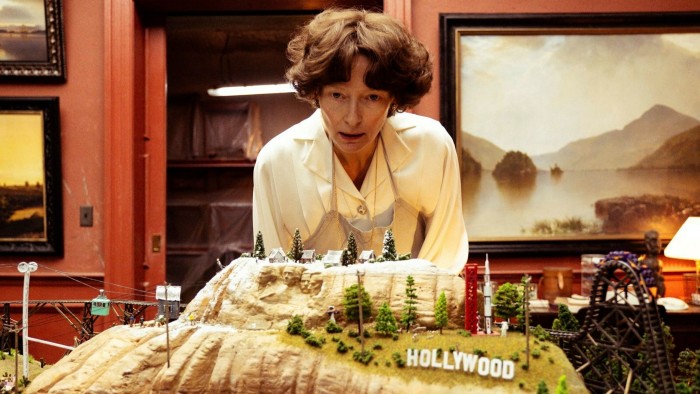Summarize this content to 2000 words in 6 paragraphs in Arabic Stay informed with free updatesSimply sign up to the Film myFT Digest — delivered directly to your inbox.The end: all good things come to it, and everything else too. The very title of the bold and cogent new film from Joshua Oppenheimer is the director’s first dark joke. The next is the whole movie, a full-tilt, belted-out musical about civilisational collapse and the American family. At one point, a character in a straw boater does a happy tap dance in the lavish bunker where the story unfolds, deep inside a salt mine, 25 years after mass extinction.Slapstick tastelessness? The Producers in the post-apocalypse? In truth, the comedy is more acid than that, to the point of not being comedy at all. Instead, you sense a cold, quiet fury to the film, set among the last of humanity. That now runs to a genteel former oil executive and his retired ballerina wife, played by Michael Shannon and Tilda Swinton, each gamely tackling the swelling choruses. A select staff is on hand. And then there is also the couple’s fragile adult son (George MacKay), who has only ever known this underworld, done out in the style of a handsome family seat. The boy spends his time recreating the lost world above. A scale model of human achievement is ongoing. (Look! The Central Pacific Railroad!) He also helps ghostwrite his father’s memoir, the old man keen to square his account with . . . whom?Mostly, the answer is his conscience. For Oppenheimer, the past relived — and rewritten — is a theme. Back in 2012, he made the documentary The Act of Killing, one of the most extraordinary films I’ve ever seen, in which members of the 1960s Indonesian death squads that once murdered opponents of the government restaged their crimes as gaudy pulp cinema.Now the director tells a tale of pasts wiped clean of guilt. “Since the beginning of time, the climate has changed,” Shannon declares. We will simply never know, he adds, if fossil fuels helped bring us here.By now, delivering much of this in song feels less prankish, and more the heart of the matter. (The tunes are modernist but not unmelodic.) In a world this artificial, how better for the characters to express their inmost thoughts? The story jolts forward with the entrance of a stranger (Moses Ingram). What happens next confirms this really is now all there is — a windowless box, the walls covered in old masters.The End is Oppenheimer’s first film as a dramatist. It is beautifully made; even the salt mine is oddly spectacular. You just wouldn’t want to live there. The performances sing with or without music, the cast sharp as sushi knives. MacKay and his haunted deadpan are particularly good.A pedant might see a flaw in the design: the seeming total planetary isolation. In reality, the recent boom among tech leaders for bunkers in New Zealand, for instance, means that country may have a sizeable population after Armageddon.It is also true some may feel “scolded”, as JD Vance recently complained of Greta Thunberg. Art lives in the real world even when it ends, and it is hard not to notice that since the movie was made, Shannon’s glib shrug about climate change has now become de facto US energy policy. Here at least, that doesn’t put him on the right side of history.And yet the villain of the piece is as much a general self-delusion, madly looking elsewhere when faced with moral pinch points. How’s that for a singalong? One quote from TS Eliot opens the film, but another echoes through it. Humankind never could bear very much reality.★★★★☆In UK cinemas from March 28
رائح الآن
rewrite this title in Arabic The End film review — a full-tilt musical about civilisational collapse
مال واعمال
مواضيع رائجة
النشرة البريدية
اشترك للحصول على اخر الأخبار لحظة بلحظة الى بريدك الإلكتروني.
© 2026 جلوب تايم لاين. جميع الحقوق محفوظة.










